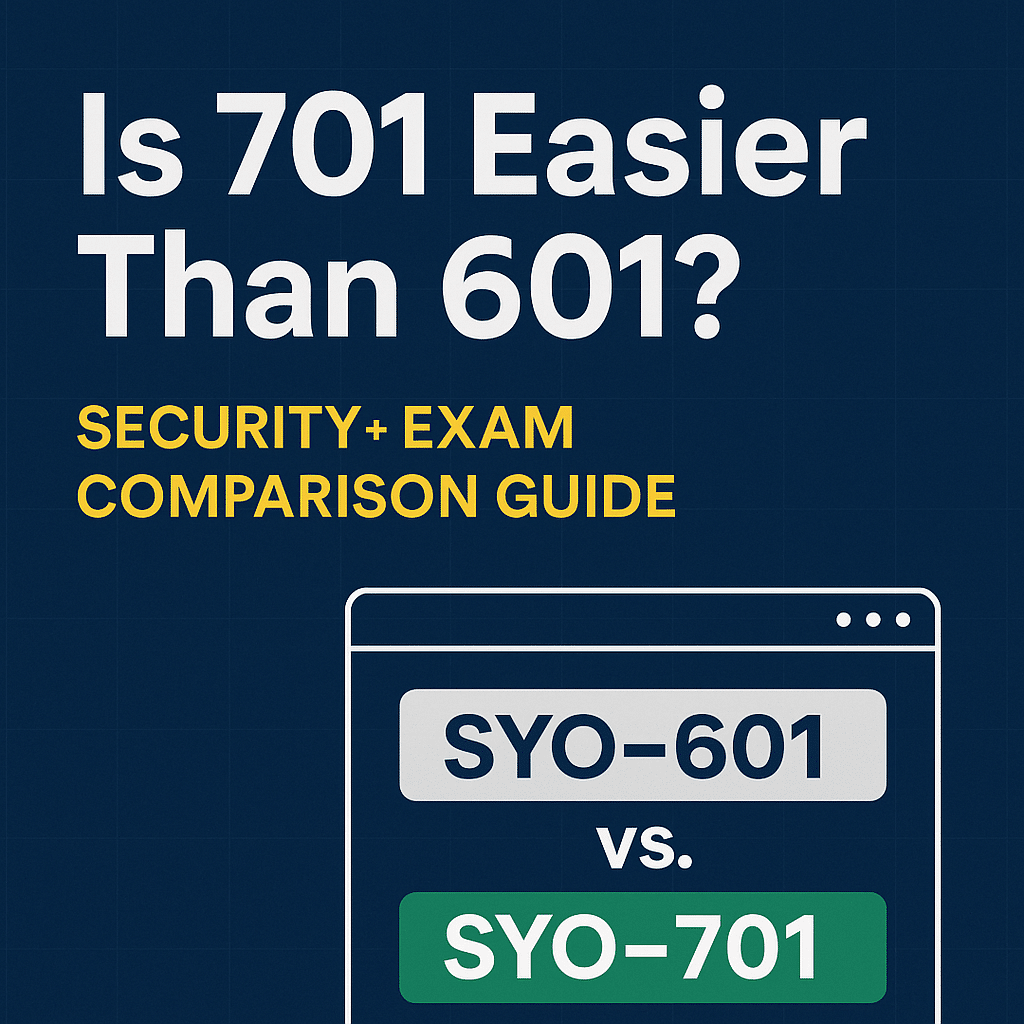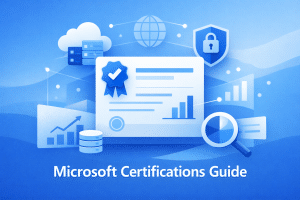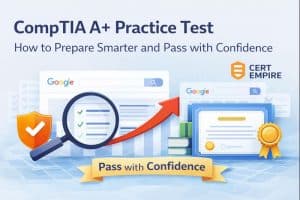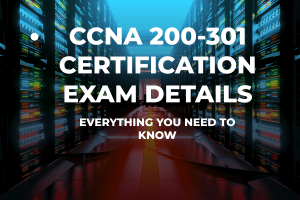TL;DR – Is 701 Easier Than 601?
No, 701 is not easier than 601. The CompTIA Security+ SY0-701 exam is more challenging because it adds cloud security, zero trust, automation, and supply chain risk management, plus more performance-based questions that test practical skills.
- 60–70% of 601 content still applies, so you don’t start from zero.
- 701 takes longer to prepare (10–14 weeks vs. 8–10 for 601).
- Employers in 2026 prefer 701 because it reflects modern security challenges.
- Cost is the same ($392), but updated study materials are essential.
- While harder, 701 delivers higher career value and prepares you for cloud, DevSecOps, and security architecture roles.
👉 Bottom line: 701 isn’t easier, but it’s the only valid option now and the smarter one for your career.
Introduction
Is 701 easier than 601? The short answer is no. The CompTIA Security+ 701 (SY0-701) exam is not easier than the older 601 (SY0-601) exam, it’s actually more challenging in some areas. But this added difficulty is a good thing because it better reflects modern cybersecurity challenges like cloud security, zero trust, and automation.
If you’re planning to take Security+ in 2026, you no longer have the choice between the two. The 601 exam officially retired in July 2024, making the 701 the only active version. Still, many learners ask this question because they want to understand how the new version compares and what it means for their preparation.
This guide breaks down everything you need to know: the differences between SY0-601 and SY0-701, study strategies, FAQs, and career value. By the end, you’ll clearly see why 701 is harder in some ways, but also more valuable for your career.
For a deeper breakdown of exam objectives, study strategies, and preparation tips, check out the Ultimate SY0-701 Exam Preparation Guide. It’s a step-by-step resource to help you prepare smarter and pass with confidence.
What Is CompTIA Security+?
CompTIA Security+ is one of the most recognized entry-level cybersecurity certifications worldwide. It validates your ability to:
- Identify and address security threats
- Implement security architecture
- Manage risks
- Understand cryptography, IAM, and network security basics
Employers often list Security+ as a baseline requirement for roles like:
- Security Analyst
- Systems Administrator
- Network Administrator
- Junior Penetration Tester
- Incident Response Specialist
In short, Security+ is the gateway certification into cybersecurity. With global recognition and compliance with DoD 8570/8140 requirements, it remains one of the most in-demand credentials.

SY0-601 vs SY0-701: Quick Comparison Table
| Feature | Security+ SY0-601 | Security+ SY0-701 |
| Status | Retired (July 2024) | Active (current) |
| Domains | 6 domains | 5 domains |
| Focus | Traditional security fundamentals | Modern security: cloud, automation, zero trust |
| Difficulty | More straightforward, theory-heavy | More practical, scenario-based, real-world |
| Employer Value | Accepted if earned before retirement | Preferred in 2026 and beyond |
💡 Notice how the 701 exam shifts toward hands-on, practical skills rather than just memorization.
Is 701 Easier Than 601?
The most common question candidates ask is: is 701 easier than 601? The honest answer is no, 701 is not easier. In fact, it is often seen as more demanding because of the new topics, exam structure changes, and practical focus.
1. Content Depth
- The 601 exam covered the core of cybersecurity fundamentals: threats, vulnerabilities, risk management, and cryptography.
- The 701 exam goes beyond these basics, focusing heavily on cloud security, zero trust architecture, automation, and advanced operations.
- This means that while 60–70% of 601 knowledge still applies, 701 requires learning new, modern skills that are directly used in today’s workplaces.
2. Exam Format
- The 601 exam leaned heavily on multiple-choice questions, which often tested theory and recall.
- The 701 exam includes more performance-based questions (PBQs) that mimic real-world scenarios. These require you to:
- Analyze logs and configurations
- Troubleshoot vulnerabilities
- Apply zero trust principles in system design
- Analyze logs and configurations
- This makes 701 more hands-on and practical, which is harder for those who only rely on memorization.
3. Time & Effort Required
- For 601, many candidates could prepare in 8–10 weeks using a mix of guides and practice tests.
- For 701, because of the added domains and depth, most learners find they need 10–14 weeks of solid preparation, especially if they are new to cybersecurity.
4. Career Value
While harder, 701 carries more value because employers care about relevant skills, not outdated knowledge. For example:
- Cloud-native companies want professionals who understand cloud security controls.
- Enterprises hiring for DevSecOps expect familiarity with automation.
- Security architects are expected to know zero trust frameworks.
👉 So while 701 is not easier than 601, it is more aligned with real-world job expectations and therefore more worth the effort.
Who Should Take SY0-701?
Since 601 retired in July 2024, all candidates now must take SY0-701. But here’s how different groups should approach it:
- Fresh Candidates
- If you’re just starting your Security+ journey, 701 is your only option.
- Don’t worry about “missing” 601 – 701 actually prepares you better for the jobs you’re aiming for.
- If you’re just starting your Security+ journey, 701 is your only option.
- Those Who Started 601 Prep
- If you were halfway through 601 prep before it retired, don’t panic.
- About 60–70% of your study material still applies.
- Focus your extra time on cloud, zero trust, automation, and supply chain risk management, these are the main new additions.
- If you were halfway through 601 prep before it retired, don’t panic.
- IT Professionals Switching Careers
- If you already have IT experience but are moving into security, 701 is ideal because it emphasizes practical application rather than just memorization.
- If you already have IT experience but are moving into security, 701 is ideal because it emphasizes practical application rather than just memorization.
- Career Advancers
- If your goal is to move into cloud security, DevSecOps, or security architecture, 701 is essential since 601 doesn’t cover these topics in depth.
Key Differences Between 601 and 701 Domains
The shift from SY0-601 to SY0-701 isn’t just about updated questions, it’s about a restructured, modernized exam blueprint. This redesign emphasizes today’s cloud-driven, automation-heavy, and zero trust–based security environment.

SY0-601 Domains (6 Total)
- Threats, Attacks, and Vulnerabilities – Identifying common threats like malware, phishing, and social engineering.
- Technologies and Tools – Understanding firewalls, IDS/IPS, SIEM tools, and endpoint security.
- Architecture and Design – Secure network design, physical security, and security models.
- Identity and Access Management (IAM) – Authentication, authorization, and account management.
- Risk Management – Policies, governance, frameworks (ISO, NIST).
- Cryptography and PKI – Symmetric/asymmetric encryption, certificates, key management.
💡 Focus: Heavily theory-based, covering broad but sometimes outdated practices.
SY0-701 Domains (5 Total)
- General Security Concepts – Foundational knowledge applied to all security practices.
- Threats, Vulnerabilities, and Mitigations – Updated to include supply chain risks, IoT, and cloud-based attacks.
- Security Architecture – Heavy emphasis on zero trust, cloud design, and hybrid environments.
- Security Operations – Day-to-day security operations, incident response, automation, and monitoring.
- Security Program Management and Oversight – Policies, governance, risk, and compliance, but integrated with modern frameworks.
💡 Focus: More practical, scenario-driven, aligned with real-world operations in 2026.
Side-by-Side Domain Comparison
| SY0-601 (Retired) | SY0-701 (Current) | Impact on Difficulty |
| 6 domains | 5 domains | 701 combines and reorganizes topics for clarity but goes deeper in cloud & automation |
| IAM as a separate domain | IAM integrated into Architecture & Operations | IAM is still there but tested in real-world scenarios, making it harder |
| Cryptography had its own domain | Cryptography embedded into multiple domains | Makes it more practical, less isolated |
| Fewer performance-based questions | More PBQs and scenario-driven labs | 701 is harder if you’re used to memorization |
| Limited cloud/zero trust coverage | Strong focus on cloud, automation, zero trust | New material = steeper learning curve |
Why This Matters
When candidates ask “is 701 easier than 601”, this domain comparison makes it clear:
- Content has shifted toward hands-on skills, not just definitions.
- The cloud and automation focus adds new layers of study.
- PBQs increase the challenge by testing applied knowledge under time pressure.
So while 601 may have felt simpler and more traditional, 701 prepares you better for real-world roles, which is exactly why employers prefer it.
Study Strategy: How to Transition from 601 to 701
If you’ve been preparing for 601 and now have to switch to 701, don’t worry, it doesn’t mean starting over. In fact, about 60–70% of your 601 preparation still applies. What you need is a focused strategy to bridge the gap.
1. Identify Overlap
Most of the fundamentals like risk management, identity and access management, and basic network security remain relevant. Keep your notes, flashcards, and practice questions from 601, because they still build a strong base.
2. Focus on the Gaps
Where you’ll need to adjust is in the new content areas introduced in 701:
- Cloud Security Architecture: Designing secure hybrid and multi-cloud systems.
- Zero Trust Implementation: Beyond theory, understanding real-world deployment models.
- Automation and Orchestration: Using scripts, SOAR platforms, and automated incident response.
- Supply Chain Security: Evaluating and mitigating third-party and vendor risks.
💡 Instead of restarting your prep, allocate 40% of your study time specifically to these new areas.
3. Update Your Study Materials
This is where many candidates go wrong; they rely on old 601 books or outdated practice tests. The result? They walk into the 701 exam unprepared for new domains.
- Use updated study guides that align with the SY0-701 objectives.
- Add cloud and automation labs to get hands-on experience.
- Use practice dumps that reflect the new PBQs and modern scenarios.
📌 At this stage, many learners turn to Cert Empire’s updated Security+ 701 dumps because they’re structured around the latest objectives. These dumps highlight the newer domains like cloud and automation while reinforcing the core fundamentals carried over from 601.
4. Balance Theory and Practice
For 601, you might have succeeded by memorizing facts. For 701, you’ll need to practice scenario-based thinking. Example study plan:
- 30% reading/study guides
- 40% hands-on labs and PBQs
- 30% practice dumps and timed tests
5. Set a Realistic Timeline
- If you had already prepared 601 fully → expect 4–6 additional weeks of study to cover the new content.
- If you were halfway through 601 → plan for 8–10 weeks total to fully transition.
- If starting fresh → expect 10–14 weeks depending on your background.
Practice Exams: Why They Matter More in 701
One of the biggest shifts from SY0-601 to SY0-701 is the exam style itself. Many people wonder “is 701 easier than 601” because they expect similar multiple-choice questions. The reality is, 701 introduces more hands-on, scenario-based performance questions (PBQs), which makes practice exams absolutely essential.
1. Difference Between 601 and 701 Question Styles
- 601 Questions: Mostly multiple-choice, testing recall of concepts. Example: “Which encryption algorithm is symmetric?”
- 701 Questions: Still includes multiple-choice, but adds PBQs where you must:
- Configure firewall rules
- Analyze log files to detect attacks
- Apply zero trust controls in a network design
- Troubleshoot vulnerabilities in real-world scenarios
- Configure firewall rules
This shift means memorization alone isn’t enough. You need practice that simulates decision-making under pressure.
2. Why Standard Question Banks Are Not Enough
Many candidates rely only on question banks with four-choice answers. While useful, these don’t replicate PBQs where you need to interact with environments, read diagrams, or respond to incidents step by step.
- PBQs test your applied knowledge, not just definitions.
- Without training on these, many candidates get caught off guard.
3. How to Use Practice Exams Effectively
- Take at least 3–5 full-length timed free practice exams before your test date.
- Mix traditional multiple-choice with PBQ-focused simulations.
- Review your mistakes carefully, don’t just memorize answers, understand why.
4. Where Cert Empire Helps
Candidates often ask where to find practice resources that truly reflect 701’s updated objectives. That’s why many learners prefer Cert Empire’s Security+ dumps. These dumps include modernized practice sets that go beyond memorization, helping you rehearse for the real-world feel of PBQs while reinforcing fundamentals from 601.
5. Practice Exam Strategy
- Start with domain-based quizzes (focus on weak areas).
- Move to full-length exams under timed conditions.
- End with targeted PBQ practice to build confidence in applied skills.
💡 By exam day, you should feel comfortable not only choosing correct answers but also solving mini “real-life” challenges in security environments.
FAQs Around “Is 701 Easier Than 601”
1. Is 701 easier than 601 for beginners?
No, 701 is not easier than 601, even for beginners. While it covers the same security fundamentals, it adds modern concepts like cloud security, zero trust, and automation. Beginners often find 701 tougher at first, but it ultimately gives them skills that employers value today.
2. How many questions are on the Security+ 701 exam compared to 601?
Both exams have up to 90 questions. The main difference is that 701 includes more performance-based questions (PBQs), which feel more difficult because they test practical problem-solving instead of just memorization.
3. Is the passing score the same for 701 and 601?
Yes. Both require a score of 750 out of 900 to pass. However, because of the greater emphasis on PBQs in 701, many candidates feel the exam is harder to score on without proper practice.
4. I already studied for 601, do I need to start over for 701?
Not at all. Around 60–70% of 601 content still applies to 701. You just need to focus on filling in the gaps: cloud, zero trust, automation, and supply chain risk. With updated practice exams and dumps, you can transition smoothly.
5. Will employers still accept the 601 certification if I passed it before retirement?
Yes, employers still recognize 601 certifications earned before July 2024. However, most hiring managers in 2026 prefer candidates with 701, since it aligns with current security practices.
6. How long does it take to prepare for the 701 exam?
On average:
- Beginners: 10–14 weeks of preparation
- IT professionals with experience: 6–8 weeks
- Those transitioning from 601 prep: 4–6 additional weeks to cover the new domains
7. Is 701 worth the extra effort?
Absolutely. Even though 701 is not easier than 601, it prepares you for real-world security challenges. This means better performance in interviews, on the job, and more career growth opportunities.
8. Are the costs different between 601 and 701?
No, the exam fee is the same: $392 USD. The difference lies in study resources, you’ll likely need to invest in updated 701 materials to cover the new topics.
Cost & Career Considerations
When asking “is 701 easier than 601”, many candidates are also really asking: “Is it worth the time, money, and effort?” Let’s break down the financial side and career value.
1. Exam Fee
- The cost of the exam is $392 USD, the same as 601.
- There’s no discount for choosing an older version since 601 retired in July 2024, 701 is the only available option.
2. Study Materials
- If you prepared for 601, you may need to purchase new books, courses, or dumps tailored to 701.
- This can add $50–$300 in additional costs, depending on whether you choose official CompTIA resources, third-party guides, or practice dumps.
- Many candidates save money by using updated Security+ dumps from trusted sources instead of purchasing multiple expensive guides.
3. Training Investments
Some learners choose bootcamps or instructor-led training, which can cost $1,000–$3,000. While valuable, this may be more than beginners want to invest. Others prefer self-paced learning, using a mix of official guides, online labs, and affordable dumps to prepare.
4. Career ROI (Return on Investment)
This is where 701 truly pays off. Employers in 2026 care about skills that apply to current security environments:
- Cloud Security – protecting AWS, Azure, and Google Cloud systems
- Zero Trust – designing networks with least privilege principles
- Automation – integrating SOAR and SIEM tools to streamline security operations
These are exactly what the 701 exam tests are. By passing it, you prove you can handle modern security roles.
💡 With Security+ 701, candidates can step into jobs like:
- Cybersecurity Analyst ($90k average salary in the U.S.)
- Security Engineer ($110k average)
- Systems Security Administrator ($85k average)
5. Long-Term Value
- Passing 701 makes it easier to move on to higher certifications (CISSP, CASP+, AWS Security, etc.).
- Employers may pay for further training once you prove yourself with a current, recognized certification.
✅ Bottom Line: While 701 isn’t easier than 601, it has greater career value because it prepares you for real-world challenges, opens higher-paying opportunities, and ensures your knowledge isn’t outdated.

Final Verdict: Is 701 Easier Than 601?
So, is 701 easier than 601? No, it isn’t. The SY0-701 Security+ exam is more challenging than 601 because it introduces cloud security, zero trust, automation, and supply chain risk management. It also emphasizes performance-based questions (PBQs), which test how you apply knowledge in real-world scenarios rather than just memorizing facts.
But this added difficulty is actually a strength. Employers in 2026 aren’t just looking for someone who can pass an old exam, they need professionals who understand modern threats and technologies. That’s exactly what 701 ensures.
If you prepared for 601, don’t view the transition as starting from scratch. 60–70% of your study foundation still applies. You just need to bridge the gap with updated resources, focusing on the newer domains that reflect today’s cybersecurity landscape.
Your Next Steps
- Start with the updated objectives – Review what’s new in 701 compared to 601.
- Invest in modern study materials – Don’t rely on outdated 601 guides; they won’t cover cloud or automation.
- Practice with PBQs – Scenario-based practice exams make the biggest difference.
- Stay consistent – Dedicate weekly study blocks to stay on track.
📌 Many learners preparing for Security+ in 2026 choose Cert Empire’s updated 701 dumps as part of their study plan. They’re designed to match the new objectives and give you practice with both fundamentals and modern security concepts, helping you pass faster and feel confident on exam day.
Closing Thought
The question “is 701 easier than 601” might sound simple, but the answer points to something bigger: cybersecurity is evolving, and so must you. The 701 exam may be harder, but it’s the only path forward and the one that actually prepares you for the jobs you want in today’s market.
If your goal is to build a strong cybersecurity career, 701 is not just your exam, it’s your opportunity.


























